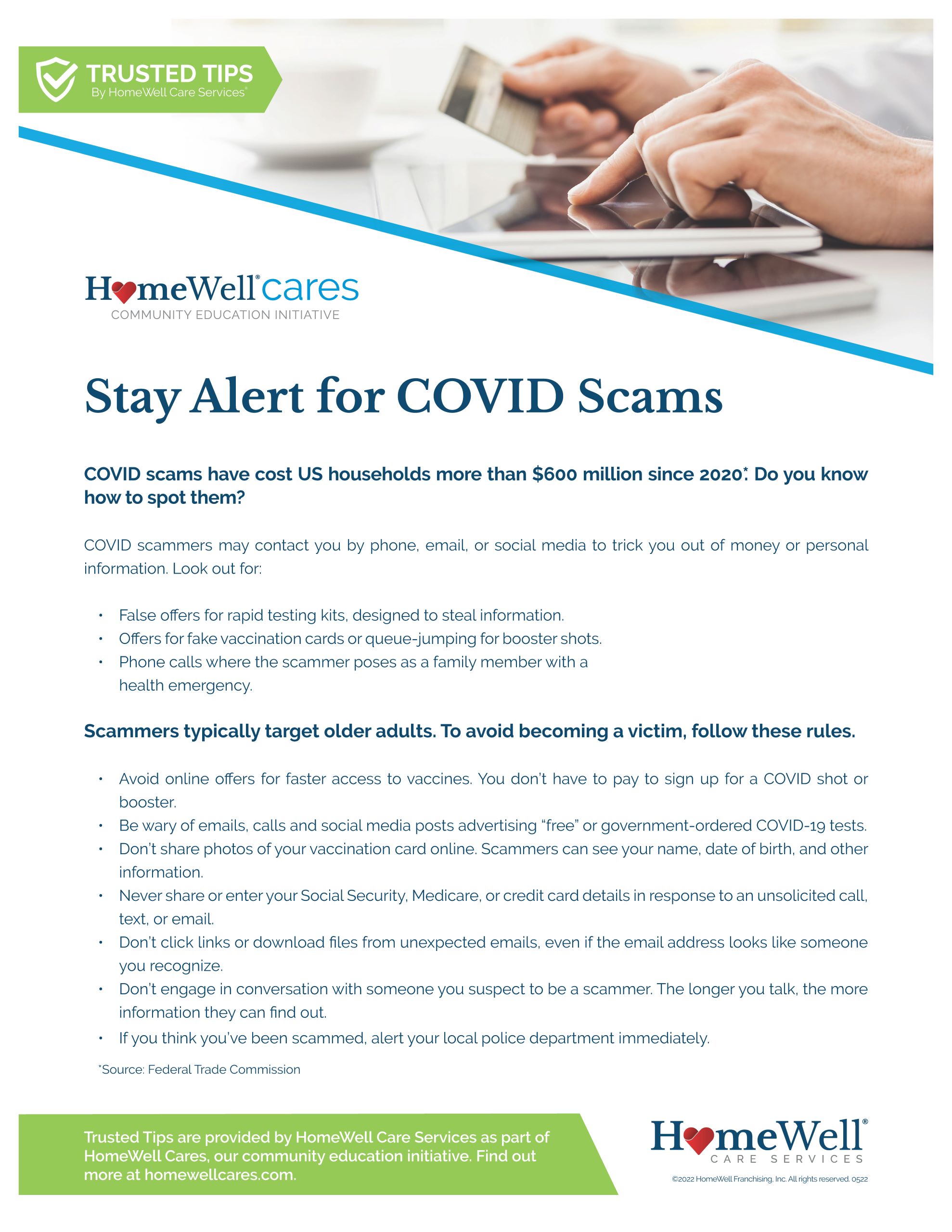Keeping Older Adults Safe from COVID Scams: A Quick Guide
COVID scams have cost US households more than $600 million since 2020*. Now, authorities are warning of a new surge of scams related to the Omicron variant, including fake or unauthorized rapid tests. These scams are often designed to target the elderly.
Scammers target older adults because they want an easy target. Seniors are more likely to be trusting, less familiar with technology, and have smaller family support networks to ask for advice.
To protect yourself and your loved ones from COVID scams, you need to know what they look like, and what to do if you encounter one.
Tip: Share our HomeWell Cares Covid Scams Trusted Tips factsheet with older adults in your family.
1: Know the Typical COVID Scam Tactics
COVID scams typically home in on people’s concerns about vaccines, testing, health, and family members. Like other scams, they use email, text, voice calls and robocalls.
Some scams aim at tricking victims into sharing bank or credit card details. Others look for personal information to use in follow-up scams, or to sell to other criminals. Common COVID scams include:
● Vaccine scams: If you’re asked for payment to make an appointment or join a waiting list, you’re dealing with a scammer. You do not have to pay to sign up for a COVID shot or booster.
Messages from people claiming to be from the federal government, asking for personal information to get a vaccine certificate, are also scams.
● Testing scams: Scammers are taking advantage of the Omicron surge to sell fake or unauthorized COVID test kits online. This is a trick to get your money and your personal or medical details.
You should only purchase FDA-approved testing kits from legitimate providers. If you make an appointment for a test online, make sure the location is an official testing site.
● Family emergency scams: Some cruel scammers target older adults, pretending to be a grandchild or family member who needs cash or a money transfer to pay a COVID-related hospital bill.
Other scammers pretend to be from FEMA’s COVID funeral assistance program. They’ll call bereaved family members to offer registration, only to steal their Social Security numbers and other details.

2: Know How to Protect Yourself from COVID Scams
Even the smartest people can fall for a smooth-talking scammer. If you suspect you’re talking to one, don’t engage. The longer you talk, the more likely you are to get fooled.
You can protect yourself by looking for these red flags and following some simple rules.
● Avoid online offers for coronavirus cures or faster access to vaccines.
● Be wary of emails, calls and social media posts advertising “free” or government-ordered COVID-19 tests.
● Never post photos of your vaccination card online. Scammers can see your name, birthday and other information.
● Never share personal information like Social Security, Medicare and credit card numbers in response to an unsolicited call, text or email.
● Don’t click links or download files from unexpected emails, even if the email address looks like a company or person you recognize.
3: Know What to Do If You’ve Been Scammed
If you suspect that you’ve fallen victim to a scam, visit the Federal Trade Commission’s guide on what to do.
You’ll need to block the scammer from contacting you again, contact your bank, credit card issuer or other financial services provider, and, finally, file a police report.
4: Share These Tips with Family Members
By knowing the signs of COVID scams in advance, older adults can protect themselves better.
You can help by downloading and sharing our Trusted Tips factsheet with your family.
Do you or a loved one need help to live independently at home?
Discussing the need for home care can be stressful. We’re here to help. Click here to find out more about HomeWell and see how we make things easier from the very first step.
*Source: Federal Trade Commission
